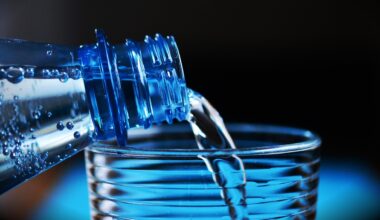The Role of Protein in Meal Replacement Shakes for Athletes
Meal replacement shakes are specifically designed to provide balanced nutrition for athletes targeting optimal performance and recovery. One of the key components of these shakes is protein, which plays a critical role in muscle repair and growth. Athletes require significant protein intake to support muscle synthesis, especially after rigorous training sessions. Meal replacement shakes often contain a variety of protein sources such as whey, casein, soy, or pea protein, each contributing unique benefits. Whey protein is fast-digesting, making it a favorite post-workout option, while casein offers a slow release of amino acids, beneficial during long periods without food. Various studies suggest that protein consumption after exercise can enhance muscle recovery time and facilitate muscle mass gain. Additionally, meal replacement shakes provide convenience, allowing athletes to refuel quickly without preparing elaborate meals. With busy schedules, these shakes serve as an efficient means to meet dietary needs while ensuring proper nutrition is maintained during intense training periods. By including high-quality protein in their meal replacement shakes, athletes can achieve their dietary goals.
Protein intake is vital for athletes seeking to maximize their performance. The right amount and type of protein can significantly influence muscle recovery and performance levels. Besides muscle recovery, protein is crucial for overall health, supporting different body functions, including hormone production and immune function. When athletes replace regular meals with meal replacement shakes, they must ensure these shakes are adequately fortified with protein to prevent any potential nutrient gaps. Many brands design their shakes to provide balanced macronutrients, including carbohydrates and fats alongside protein. It is essential for athletes to choose shakes that align with their specific needs and energy expenditure. Beyond the nutritional profile, incorporating meal replacement shakes as part of a diet can simplify meal planning. Athletes often travel or have tight schedules, making it challenging to access traditional meals. These shakes not only provide a quick source of protein but are often available in various flavors, ensuring taste and satisfaction. By supplementing their diets with meal replacement shakes rich in protein, athletes can effectively manage their nutritional intake while supporting their active lifestyle and fitness goals.
Understanding Protein Types in Shakes
Understanding the various types of protein included in meal replacement shakes aids athletes in making informed choices. Whey protein is among the most popular, known for its rapid digestion and high biological value. This means that the body can utilize it efficiently after a workout. For those who are lactose intolerant or prefer plant-based options, soy and pea proteins are excellent alternatives, offering significant amino acid profiles beneficial for muscle growth. Casein protein, on the other hand, digests slowly and provides a sustained release of amino acids, which can be particularly useful during prolonged periods between meals or during the night. Moreover, certain shakes may incorporate whole food ingredients like oats or nut powders for added nutritional support. When selecting meal replacement shakes, athletes should consider their workout schedules, dietary restrictions, and personal preferences. Additionally, understanding the role of protein types can help in determining the most effective shake for pre- or post-workout consumption. Protein not only aids in muscle recovery but also promotes satiety, making meal replacement shakes an effective tool for managing hunger as part of a balanced diet.
The timing of protein intake is equally important for athletes utilizing meal replacement shakes. Consuming protein shortly after exercise can maximize muscle recovery and stimulate repair processes. Research indicates that there’s an anabolic window of opportunity after exercise during which protein synthesis is enhanced. Therefore, athletes are encouraged to consume meal replacement shakes within this timeframe to optimize recovery. Additionally, for athletes involved in strength training or high-intensity sports, the recommended protein intake may range from 1.6 to 2.2 grams per kilogram of body weight. This range reflects the increased demands placed on the body during strenuous training. Meal replacement shakes should not only focus on protein content but also incorporate essential vitamins and minerals. These nutrients support overall health, immune function, and energy levels. Hence, selecting a shake that includes added micronutrients can significantly benefit athletes’ performance. Overall, timing, quantity, and quality of protein are essential factors influencing muscle recovery and performance enhancement, emphasizing the role of nutrition in athletic success.
The Role of Amino Acids
Proteins are composed of amino acids, which act as the building blocks for muscle tissue and other bodily functions. Among these amino acids, essential amino acids cannot be synthesized by the body and must be obtained from food sources, such as meal replacement shakes. Additionally, branched-chain amino acids (BCAAs) are particularly beneficial for athletes as they help reduce muscle soreness and promote recovery. A well-formulated meal replacement shake should contain a complete protein source that provides all essential amino acids required for muscle repair. Furthermore, some shakes may be fortified with additional BCAAs to enhance recovery further. For endurance athletes, maintaining amino acid availability is crucial during long training sessions to reduce fatigue and muscle breakdown. By incorporating a meal replacement shake rich in essential amino acids, athletes can ensure their body has the necessary resources to recover effectively and maintain performance levels. Choosing shakes that highlight the amino acid profile can help athletes meet their nutritional goals while boosting their training regimen. This attention to amino acids plays a vital role in supporting athletic performance and overall well-being.
While meal replacement shakes are beneficial, athletes should not solely rely on them for their nutritional needs. Whole foods play an integral role in providing fiber, antioxidants, and other nutrients not always present in these shakes. Therefore, a balanced diet consisting of diverse whole foods should work harmoniously with meal replacement shakes. It is critical for athletes to prioritize whole carbohydrate sources like fruits, vegetables, and whole grains, as these offer essential nutrients that enhance performance. Additionally, incorporating good fats from nuts, seeds, and avocados ensures that athletes receive adequate nutrition. Shake supplementation can offer convenience and quick nutrient delivery; however, moderation is key to avoid dependency. Athletes should maintain a schedule that includes regular meals alongside the shakes for optimal nutrition. Meal replacement shakes can serve as an excellent support tool for busy lifestyles but should complement a diet focused on whole foods. By balancing shakes with solid foods, athletes can obtain a more complete nutrient profile that supports their energy needs and recovery, enhancing their overall athletic performance.
Conclusion and Recommendations
In conclusion, protein-rich meal replacement shakes are an effective solution for athletes to meet their nutritional demands. By selecting quality shakes containing a variety of protein types, athletes can foster muscle recovery and maintain performance levels. Awareness of proper protein timing and amino acid intake is crucial in developing effective strategies for recovery and performance enhancement. However, athletes must not overlook the importance of incorporating whole foods into their diets, which provide essential nutrients that shakes alone may lack. The combination of meal replacement shakes with a balanced diet ensures that all nutritional bases are covered. It’s advisable for athletes to consult with a nutritionist or dietitian to determine individual protein needs based on specific exercise regimens and goals. This personalized approach can greatly enhance their dietary effectiveness. However, meal replacement shakes can be an excellent addition to an athlete’s diet if used wisely and in moderation. Ultimately, fueling the body with the right nutrients is essential for achieving peak athletic performance and long-term health.
To sum up, the integration of meal replacement shakes into an athlete’s nutritional strategy can play a pivotal role in optimizing performance and recovery. By understanding their nutritional goals and the importance of adequate protein intake, athletes can harness the benefits of these shakes while adhering to a diet rich in whole foods. Monitoring protein intake, meal timing, and a balanced diet enhances nutrient absorption and contributes to an athlete’s overall well-being. It’s crucial to choose high-quality meal replacement shakes fortified with essential nutrients tailored to individual needs. With the right approach, meal replacement shakes can be a significant ally in a competitive athlete’s journey, helping them reach new heights in their performance and supporting their health effectively.


